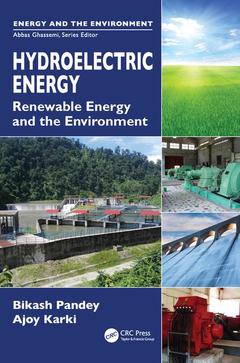Description
Hydroelectric Energy
Renewable Energy and the Environment
Energy and the Environment Series
Language: English
Subject for Hydroelectric Energy:
Keywords
Gravel Trap; hydropower; Penstock Pipe; plant; Headrace Canal; penstock; Impulse Turbine; pipes; Hydropower Plant; gravel; Outlet Velocity Triangles; trap; Turbine Runner; settling; Reaction Turbines; basin; Cross-flow Turbine; headrace; Pelton Turbine; canal; Blade Angle; Net Head; Guide Vane Angle; Guide Vane; Power Plant; Head Loss; Runner Diameter; Francis Turbines; Ballast Load; HDPE Pipe; Specific Speed; Anchor Blocks; Mini Hydropower Plant; Hydropower Project; Inlet Velocity Triangle
419 p. · 17.8x25.4 cm · Hardback
Description
/li>Contents
/li>Readership
/li>Biography
/li>
Providing essential theory and useful practical techniques for implementing hydroelectric projects, this book outlines the resources, power generation technologies, applications, and strengths and weaknesses for hydroelectric technologies. Emphasizing the links between energy and the environment, it serves as a useful background resource and facilitates decision-making regarding which renewable energy technology works best for different types of applications and regions. Including examples, real-world case studies, and lessons learned, each chapter contains exercise questions, references, and ample photographs and technical drawings from actual micro hydropower plants.
Development of Hydropower, Basics of Hydropower, Site Selection and Feasibility Study for Hydropower Projects, Intake and Diversion Works, Headrace, Gravel Trap, Settling Basin, and Forebay,Penstocks, Powerhouse, Hydraulic Turbines, Impulse Turbines, Very Low Head and River Current Turbines, Electrical Power, Economic Analysis of Infrastructure Projects, Participatory Processes in Hydropower Development, Index
Bikash Pandey is the Innovations Lead for Clean Energy at Winrock International, based in Washington, DC. His work experience encompasses 25 years in policy design, review, and implementation of a range of clean/renewable energy and climate change projects in Asia, Africa, and Latin America. His current areas of work include clean energy finance, low emission development, last mile electrification through mini-grids, community-based electrification, and powering agriculture. Mr. Pandey is one of the pioneers of mobilizing independent power producer (IPP) investment into hydroelectricity and establishing a micro-hydro sector in Nepal to electrify rural communities. He has designed hydropower programs and trained practitioners in over a dozen countries in the proper design of hydropower systems. Mr. Pandey is also actively involved in global discussions around sustainable development of hydroelectricity. He participated as a member of the forum thatset up the World Commission on Dams. Mr. Pandey holds an MS degree from the Energy and Resources Group at the University of California, Berkeley, and an SB degree in electrical engineering from MIT.
Ajoy Karki is a water resources engineer with over 22 years of experience in management, design, and studies of hydropower, rural electrification, and renewable energy projects. He has worked as a hydropower engineer in 15 countries covering South Asia, Central Asia, and East and West Africa. He completed his MS degree in hydraulic engineering at IHE-UNESCO, the Netherlands, in 2000. He also holds degrees in civil engineering from the University of Iowa and physics (cum laude) from Coe College, Iowa. Mr. Karki has published a number of papers as both the lead author and a coauthor in the South Asian Energy Journal, Pakistan; Asian Institute of Technology (AIT), Thailand; World Resource Foundation, UK; and Earthscan, UK. He has also provided extensive training courses in hydropower design in various countries in




